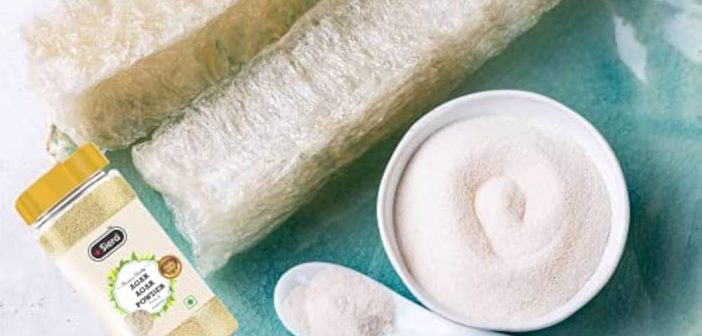Agar-agar, commonly referred to as “China grass” in India, is a plant-based gelatin derived from red seaweed. Known for its versatile culinary applications and incredible health benefits, this natural ingredient has long been a staple in Asian cuisines and desserts. However, its popularity in India is on the rise, not only as a vegan and vegetarian alternative to gelatin but also as a powerful superfood with numerous health benefits.
This guide explores the origins of agar-agar, its nutritional value, health benefits, and practical ways to incorporate it into your daily Indian meals.
What is Agar-Agar?
Agar-agar is a jelly-like substance extracted from red algae, specifically species like Gracilaria and Gelidium. It has been used in traditional cooking for centuries, especially in Japanese, Chinese, and Malaysian dishes. In India, it is most commonly recognized as the key ingredient in puddings, jellies, and faloodas.
Agar-agar is tasteless, odorless, and colorless, making it an excellent thickening agent for desserts, soups, and gravies. It is also heat-stable, which means it maintains its consistency even in hot climates.
Agar-agar is available in various forms, including strips, flakes, powders, and bars. The powdered version is the most convenient and commonly used in Indian households.
Nutritional Value of Agar-Agar
Agar-agar is a nutritional powerhouse. Here’s what makes it stand out:
- Low in Calories: Agar-agar is virtually calorie-free, making it an excellent choice for weight-conscious individuals.
- Rich in Fiber: Agar-agar is loaded with soluble fiber, which aids digestion and promotes gut health.
- Free from Fats and Cholesterol: This makes it a heart-friendly option for those aiming to reduce their cholesterol levels.
- Rich in Minerals: It contains vital minerals like calcium, magnesium, iron, and manganese.
- Vegan and Gluten-Free: A boon for those following vegan, vegetarian, or gluten-free diets.
Health Benefits of Agar-Agar
Agar-agar is more than just a culinary ingredient; it is a functional food with numerous health benefits:
- Improves Digestion
The high fiber content in agar-agar acts as a natural laxative. It absorbs water in the digestive tract, bulks up stool, and aids in smoother bowel movements. It is particularly beneficial for those suffering from constipation. - Aids in Weight Loss
Agar-agar is incredibly low in calories and highly filling. Its fiber content promotes satiety, reducing the chances of overeating. When consumed before meals, agar-agar can suppress appetite, making it easier to control portion sizes. - Regulates Blood Sugar Levels
For individuals with diabetes, agar-agar is a valuable dietary addition. Its ability to slow down the absorption of sugar into the bloodstream helps regulate blood sugar levels, preventing sudden spikes. - Supports Heart Health
Being fat-free and cholesterol-free, agar-agar is heart-friendly. Its soluble fiber helps lower LDL (bad cholesterol) levels, reducing the risk of heart diseases. - Boosts Bone Health
Rich in calcium and magnesium, agar-agar strengthens bones and teeth. Regular consumption can help prevent conditions like osteoporosis, especially in older adults. - Improves Gut Health
Agar-agar acts as a prebiotic, nourishing the beneficial bacteria in the gut. A healthy gut microbiome is essential for overall well-being, from improved immunity to better mental health. - Promotes Healthy Skin
Agar-agar is rich in natural collagen, which can enhance skin elasticity and reduce the appearance of fine lines. It also helps in detoxifying the body, which reflects positively on skin health.
How to Use Agar-Agar in Indian Foods
Agar-agar’s versatility makes it easy to incorporate into everyday Indian cooking. Here are some practical and creative ways to use it:
- Desserts
Agar-agar is widely used in Indian desserts like falooda, kulfi, and puddings. You can make a simple mango jelly by mixing agar-agar powder with fresh mango pulp, sugar, and water. Similarly, you can create a refreshing rose-flavored jelly for a festive treat. - Soups and Stews
Add a small amount of agar-agar to soups like tomato or mushroom soup to enhance the texture and make them heartier. This is especially useful for weight-conscious individuals as it adds bulk without extra calories. - Homemade Paneer Substitute
For vegans, agar-agar can be used to make plant-based paneer or cheese. Mix soy milk with agar-agar and let it set to create a firm, sliceable alternative to dairy paneer. - Chutneys and Dips
Add agar-agar to chutneys and dips to thicken them without changing their flavor. For example, a mint-coriander chutney with a hint of agar-agar will have a smoother consistency, perfect for spreading or dipping. - Health Drinks
Agar-agar can be added to drinks like nimbu paani (lemon water) or buttermilk to enhance their nutritional profile. Simply dissolve agar-agar powder in warm water and mix it into your drink. - Healthy Snacking
Make guilt-free snacks by using agar-agar to prepare nutrient-dense energy bars. Combine nuts, dried fruits, and seeds with agar-agar syrup, let it set, and cut into bars for a quick, healthy snack. - Idlis and Dosas
Add a pinch of agar-agar powder to idli or dosa batter to achieve a fluffier texture. This is especially helpful in regions where fermentation can be challenging due to cooler temperatures.
How to Prepare Agar-Agar
Preparing agar-agar is simple. For every 500 ml of liquid, use 5-7 grams of agar-agar powder. Dissolve the powder in warm water or milk, boil the mixture for a minute, and let it cool to set. If you’re using agar-agar strips or flakes, soak them in water for 10-15 minutes before heating to dissolve.
Tips for Using Agar-Agar in Indian Kitchens
- Experiment with Flavors: Agar-agar is tasteless, so you can add your choice of flavorings, from cardamom and saffron to vanilla and rose essence.
- Use Fresh Ingredients: Pair agar-agar with fresh, seasonal fruits and vegetables for maximum health benefits.
- Avoid Overheating: While agar-agar is heat-stable, overheating can sometimes reduce its gelling properties.
- Combine with Spices: Incorporate Indian spices like turmeric, cumin, or black pepper for added health benefits.
Cost and Availability in India
Agar-agar is widely available in Indian markets and online stores. A 100-gram packet of agar-agar powder costs around ₹200-₹300, while agar-agar strips or flakes are slightly more expensive. Given that a small amount goes a long way, it’s an economical addition to your pantry.
Final Thoughts
Agar-agar is a hidden gem in the Indian kitchen, offering a myriad of health benefits and culinary possibilities. Whether you’re looking to lose weight, improve digestion, or simply add variety to your meals, this plant-based superfood can help you achieve your goals. Its versatility and ease of use make it a must-have for anyone seeking a healthier lifestyle.
Incorporating agar-agar into your daily meals doesn’t require fancy recipes or expensive ingredients. With a little creativity and experimentation, you can transform your traditional dishes into nutrient-rich, guilt-free delights. Embrace agar-agar as part of your everyday cooking and enjoy the benefits of this natural wonder.






